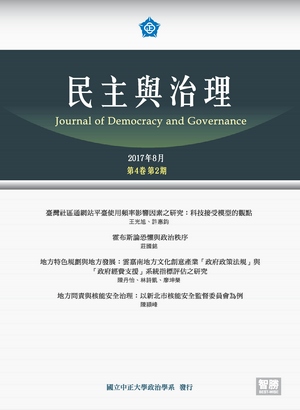Hot News
| 中文篇名 |
地方問責與核能安全治理:以新北市核能安全監督委員會為例 免費試閱 | |
|---|---|---|
| 英文篇名 |
Accountability at Local Level and Nuclear Governance: The Case of Nuclear Safety Monitoring Council in New Taipei City | |
| 作者 | ||
| 中文摘要 |
自日本福島核能災變以來,臺灣核能安全體系受到國人的矚目,地方政府也開始重視核能安全問題,尤以擁有三座核電廠的新北市政府最為積極;然而在臺灣的核能安全治理體系中,地方政府長期缺乏參與和監督的機會。為了能有效參與核能安全防災與體系,新北市政府自2013 年決定成立新北市核能安全監督委員會,作為核能安全的審議機關,此亦為臺灣第一個由地方政府成立的核能安全治理架構。 | |
| 英文摘要 |
Since the Fukushima accident in 2011, Taiwan’s nuclear safety system has been paid great amounts of attention. The local government of the New Taipei City, in which three nuclear plants and possible future interim nuclear waste repository sites are located, has particularly showed its interests in monitoring those facilities. However, in Taiwan’s nuclear governance system, local government has long been deprived from the rights of participation and monitoring. In order to effectively be a part of the governance, the New Taipei City, for the first time in the history of Taiwan’s local governance, has established its own monitoring council to review safety issues of those facilities. | |
| 關鍵詞 |
地方治理、核安治理、問責、透明度、審議式民主、local governance、nuclear governance、accountability、transparency、deliberative democracy | |
| 刊名 | ||
| 期數 | ||
| 起訖頁 |
109-150 | |
| 出版單位 |
國立中正大學政治學系 | |
| DOI | ||
| QRCode |
| |
| 上一篇 |



